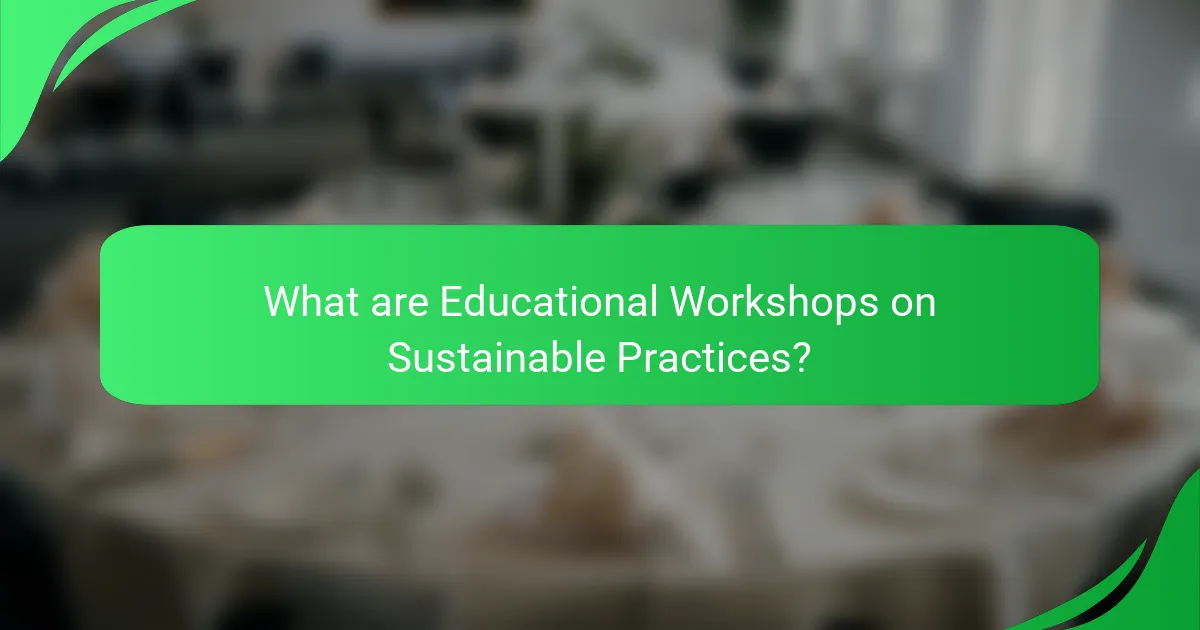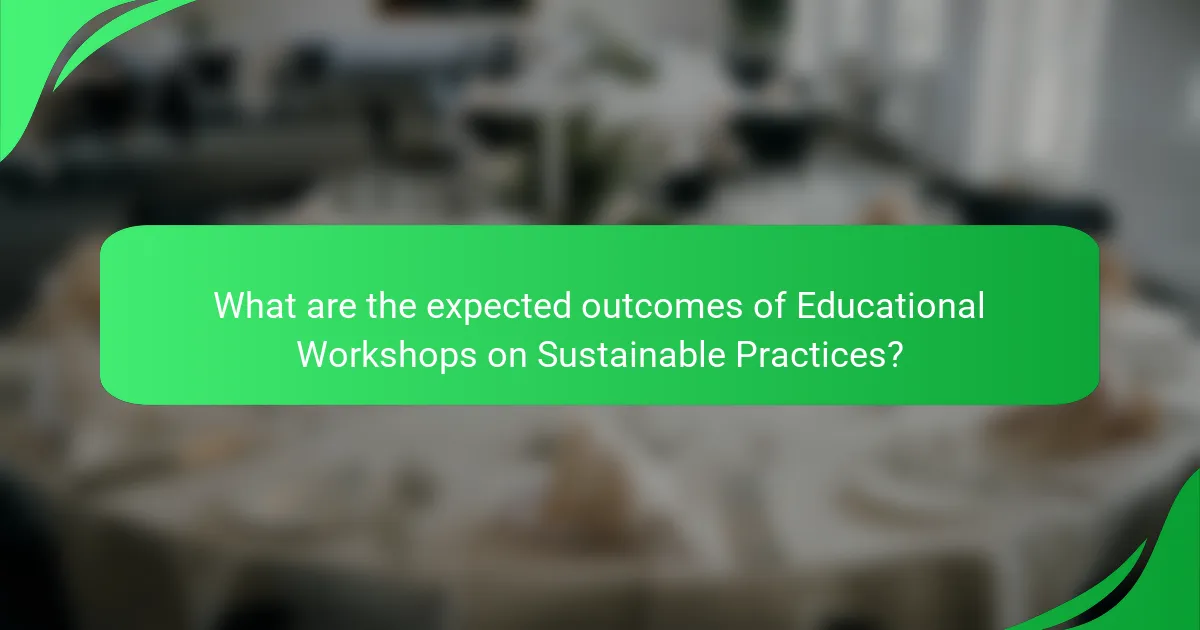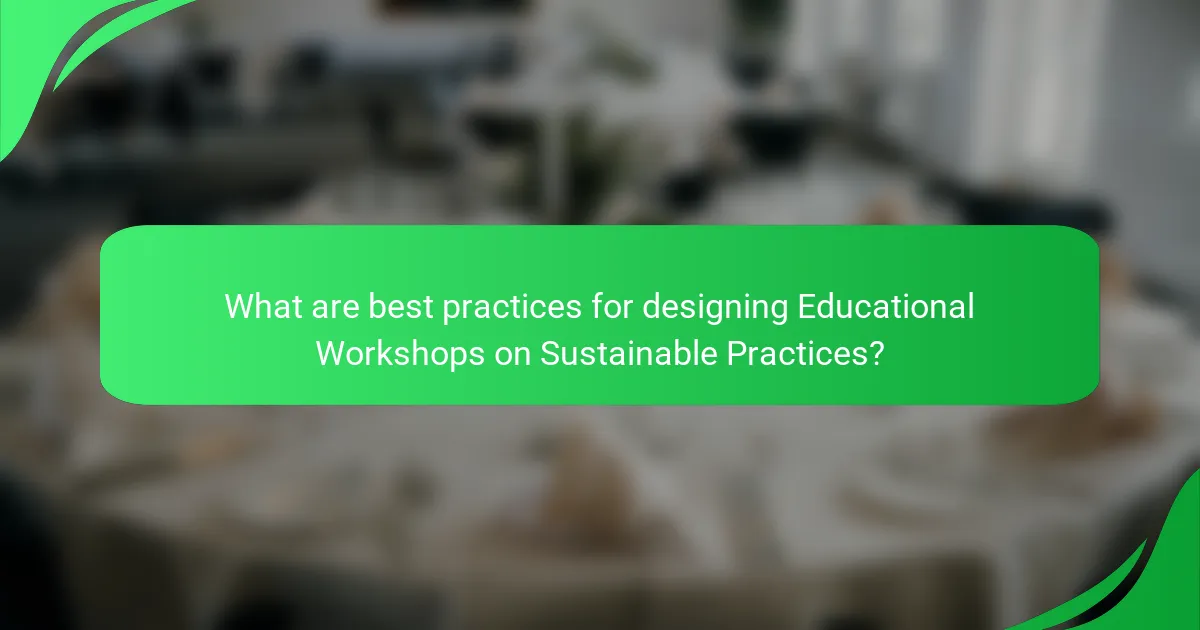Educational workshops on sustainable practices are structured programs aimed at teaching individuals environmentally friendly methods and behaviors. These workshops cover key topics such as waste reduction, energy efficiency, and sustainable agriculture, engaging participants through hands-on activities and discussions. Research indicates that these workshops can significantly enhance awareness and adoption of sustainable habits, with many participants reporting behavioral changes post-attendance. Best practices for designing these workshops include defining clear objectives, utilizing interactive methods, and providing resources for ongoing engagement. The article will explore the formats of these workshops, target audiences, and the expected outcomes for individuals and communities.

What are Educational Workshops on Sustainable Practices?
Educational workshops on sustainable practices are structured programs designed to teach individuals about environmentally friendly methods and behaviors. These workshops focus on various topics, including waste reduction, energy efficiency, and sustainable agriculture. Participants engage in hands-on activities, discussions, and presentations. The goal is to empower attendees with knowledge and skills to implement sustainable practices in their daily lives. Research shows that such workshops can significantly increase awareness and adoption of sustainable habits. For example, a study by the National Institute of Environmental Health Sciences found that educational interventions can lead to a 30% increase in recycling behaviors among participants.
How do Educational Workshops on Sustainable Practices contribute to sustainability?
Educational workshops on sustainable practices contribute to sustainability by equipping participants with knowledge and skills. These workshops promote awareness of environmental issues and sustainable solutions. They encourage behavior change towards more sustainable lifestyles. Participants learn about resource conservation, waste reduction, and renewable energy.
Research shows that education can significantly impact environmental behavior. A study by the National Academies of Sciences found that effective education increases pro-environmental behaviors. Workshops also foster community engagement and collaboration on sustainability initiatives. This collective effort amplifies the impact of individual actions.
In summary, educational workshops serve as a vital tool for advancing sustainability through informed and engaged communities.
What key concepts are covered in these workshops?
The key concepts covered in these workshops include sustainable practices, environmental awareness, and community engagement. Workshops focus on practical strategies for reducing waste and conserving resources. Participants learn about renewable energy sources and their applications. The curriculum often includes hands-on activities to reinforce learning. Workshops also address the importance of biodiversity and ecosystem preservation. Discussions may cover sustainable agriculture and food systems. Experts often share case studies and success stories. Overall, the workshops aim to empower individuals and communities to adopt sustainable behaviors.
How do these workshops promote environmental awareness?
Workshops promote environmental awareness by educating participants on sustainable practices. They provide hands-on experiences that illustrate the impact of individual actions on the environment. Interactive discussions encourage critical thinking about environmental issues. Workshops often include expert speakers who share knowledge and research findings. For instance, studies show that participants retain information better through experiential learning. Additionally, these workshops foster community engagement and collaboration on local environmental initiatives. By connecting individuals with local ecosystems, they enhance appreciation for nature. This approach leads to increased motivation for sustainable behavior changes.
What formats are available for Educational Workshops on Sustainable Practices?
Educational workshops on sustainable practices are available in several formats. Common formats include in-person workshops, online webinars, and hybrid sessions. In-person workshops allow for hands-on activities and direct engagement. Online webinars provide accessibility for remote participants. Hybrid sessions combine both in-person and online elements, catering to diverse audiences. Each format can be tailored to specific learning objectives and participant needs. These formats enhance learning experiences and promote sustainable practices effectively.
What are the most common formats used?
The most common formats used for educational workshops on sustainable practices include in-person workshops, online webinars, and hybrid sessions. In-person workshops allow for hands-on activities and direct interaction. Online webinars provide flexibility and accessibility to a wider audience. Hybrid sessions combine both in-person and online elements, catering to diverse learning preferences. According to a report by the International Society for Sustainability Professionals, 75% of organizations prefer in-person formats for engagement, while 60% value online options for convenience. These statistics highlight the effectiveness and popularity of various workshop formats in promoting sustainable practices.
How does the format impact participant engagement?
The format of educational workshops significantly impacts participant engagement. Different formats, such as hands-on activities, lectures, or group discussions, cater to varied learning styles. For instance, interactive formats tend to enhance participation by encouraging active involvement. Research indicates that workshops incorporating practical exercises can increase retention rates by up to 75%. Additionally, visual and auditory elements in the format can maintain attention and interest. A study by the National Training Laboratory found that participants retain only 5% of information from lectures but 75% from practice. Therefore, the choice of format directly influences how engaged participants feel and how effectively they absorb information.
Who are the target audiences for Educational Workshops on Sustainable Practices?
The target audiences for educational workshops on sustainable practices include students, educators, and community members. Students often seek knowledge on sustainability for academic projects. Educators aim to integrate sustainable practices into their curricula. Community members are interested in implementing sustainable practices in their daily lives. Additionally, local businesses may attend to learn about sustainable operations. Government officials might participate to develop policies promoting sustainability. Non-profit organizations often seek collaboration to enhance their sustainability initiatives. Each group plays a vital role in promoting sustainable practices within their respective environments.
What demographics are most likely to attend these workshops?
Individuals aged 25 to 45 are most likely to attend these workshops. This age group often shows a strong interest in sustainability. They are typically more environmentally conscious and actively seek educational opportunities. Additionally, professionals in related fields, such as education, environmental science, and community planning, frequently participate. Research indicates that younger generations prioritize sustainability in their personal and professional lives. According to a survey by the Pew Research Center, 70% of adults aged 18-29 believe that climate change is a major threat. This demographic trend reflects a growing commitment to sustainable practices.
How do different audiences influence workshop content?
Different audiences significantly influence workshop content by determining the focus, depth, and delivery methods. Tailoring content to specific audience needs ensures relevance and engagement. For instance, a workshop for professionals may emphasize advanced techniques, while a community workshop might cover basic concepts. Audience demographics, such as age and background, also shape the language and examples used. Research by Knowles et al. (2012) highlights that [censured] learners prefer practical applications over theoretical discussions. Furthermore, audience feedback can guide adjustments in real-time, enhancing the overall effectiveness of the workshop. Understanding these dynamics is crucial for achieving desired educational outcomes.

What are the expected outcomes of Educational Workshops on Sustainable Practices?
Educational workshops on sustainable practices are designed to enhance knowledge and skills related to sustainability. Participants typically gain a deeper understanding of environmental issues. They learn practical methods for reducing their ecological footprint. Workshops often result in increased community engagement in sustainability initiatives. Attendees may also develop new habits that promote sustainable living. Research indicates that 80% of participants report implementing changes after attending such workshops. Additionally, workshops can foster collaboration among local organizations and individuals. This collective effort can lead to more significant environmental impact in the community.
How do participants benefit from attending these workshops?
Participants benefit from attending these workshops by gaining practical knowledge and skills in sustainable practices. They learn about environmentally friendly techniques that can be applied in their daily lives. Workshops often include hands-on activities that enhance learning retention. Participants also have the opportunity to network with like-minded individuals. This networking can lead to collaborations and community building. Research indicates that participants report increased confidence in implementing sustainable practices after attending such workshops. A study by the National Institute of Environmental Health Sciences found that 85% of participants felt empowered to make eco-friendly changes post-workshop. Overall, these workshops equip individuals with the tools needed to contribute to sustainability efforts effectively.
What skills or knowledge do participants gain?
Participants gain practical skills in sustainable practices. They learn techniques for waste reduction, energy efficiency, and resource management. Knowledge about sustainable materials and eco-friendly technologies is also acquired. Participants understand the importance of biodiversity and conservation efforts. They develop critical thinking skills related to environmental challenges. Networking with like-minded individuals enhances collaboration skills. Hands-on activities reinforce learning through real-world applications. Research shows that workshops improve participants’ ability to implement sustainable practices in their communities.
How can the outcomes be measured effectively?
Outcomes can be measured effectively through specific metrics and evaluation methods. Pre- and post-workshop surveys can assess knowledge gains. Attendance rates provide insight into engagement levels. Participant feedback forms can highlight satisfaction and areas for improvement. Observation during workshops can evaluate participant interaction and involvement. Long-term follow-up surveys can measure the application of learned practices. Data collection should be systematic and consistent for accuracy. Research indicates that utilizing multiple measurement methods increases reliability (Kirkpatrick Model, 1994).
What challenges do organizers face when conducting these workshops?
Organizers face multiple challenges when conducting educational workshops on sustainable practices. One major challenge is securing adequate funding. Many workshops rely on grants or sponsorships that may not be guaranteed. Another challenge is attracting participants. Engaging the target audience can be difficult, especially if they are unaware of the workshop’s benefits. Logistical issues also arise, such as finding suitable venues and ensuring necessary materials are available. Additionally, organizers must navigate varying levels of participant knowledge and interest in sustainability. Managing diverse expectations can complicate the planning process. Finally, evaluating the effectiveness of the workshops poses a challenge, as measuring outcomes can be subjective and complex.
How can organizers overcome common obstacles?
Organizers can overcome common obstacles by implementing strategic planning and effective communication. Clear objectives help in identifying potential challenges early. Regular check-ins among team members foster collaboration. Utilizing feedback from previous events allows for continuous improvement. Resource allocation must be monitored to avoid shortages. Engaging with stakeholders ensures alignment with goals. Training volunteers enhances their capability to assist. Lastly, adapting to unforeseen circumstances with flexibility is crucial for success.
What strategies enhance the effectiveness of workshops?
Interactive engagement strategies enhance the effectiveness of workshops. These strategies include hands-on activities and group discussions. Research indicates that active participation increases retention of information. Visual aids also improve understanding and engagement. According to a study by the University of California, workshops that incorporate multimedia elements see a 30% increase in participant satisfaction. Additionally, setting clear objectives helps participants focus on key learning outcomes. Feedback mechanisms, such as surveys, allow facilitators to adjust content in real-time. Finally, follow-up resources reinforce learning after the workshop concludes.

What are best practices for designing Educational Workshops on Sustainable Practices?
Best practices for designing educational workshops on sustainable practices include clearly defining objectives. Workshops should focus on specific sustainability topics, such as waste reduction or energy efficiency. Engaging participants through interactive activities enhances learning retention. Incorporating real-life examples makes concepts relatable and applicable. Utilizing diverse teaching methods caters to various learning styles. Providing resources for further exploration encourages continued engagement. Gathering feedback post-workshop helps refine future sessions. Research shows that interactive workshops increase knowledge retention by 70% compared to traditional lectures.
How can facilitators create an engaging workshop environment?
Facilitators can create an engaging workshop environment by fostering collaboration and interaction among participants. Setting clear objectives helps attendees understand the workshop’s purpose. Utilizing varied teaching methods, such as group discussions and hands-on activities, keeps participants actively involved. Incorporating multimedia resources, like videos and presentations, can enhance learning experiences. Providing opportunities for feedback encourages participants to share their thoughts. Creating a welcoming atmosphere promotes comfort and openness. Research shows that interactive workshops lead to higher retention rates, as participants are more likely to remember information when engaged.
What techniques encourage participant interaction?
Techniques that encourage participant interaction include group discussions, hands-on activities, and interactive technology. Group discussions foster dialogue and allow participants to share ideas. Hands-on activities engage participants in practical experiences, making learning more memorable. Interactive technology, such as polls and quizzes, can stimulate engagement and provide immediate feedback. Research indicates that active participation enhances retention of information. According to a study by Bonwell and Eison, interactive techniques can lead to higher levels of student engagement and satisfaction.
How can feedback be incorporated into workshop design?
Feedback can be incorporated into workshop design through various methods. First, pre-workshop surveys can gather participant expectations and preferences. This data helps tailor content to meet audience needs. During the workshop, real-time polls can assess understanding and engagement. This allows for immediate adjustments to the delivery approach. Post-workshop evaluations can collect insights on participant satisfaction and learning outcomes. Analyzing this feedback informs future workshop iterations. Research shows that incorporating feedback leads to improved participant experiences and learning retention. Studies indicate that workshops designed with participant input yield higher satisfaction rates.
What resources are available for developing Educational Workshops on Sustainable Practices?
Available resources for developing educational workshops on sustainable practices include online platforms, local organizations, and academic institutions. Online platforms like Coursera and EdX offer courses on sustainability topics. Local organizations often provide materials and expertise for community engagement. Academic institutions may offer research papers and case studies to support workshop content. Additionally, government agencies often publish guidelines and toolkits for sustainable practices. Nonprofits also frequently share resources and best practices for education in sustainability. These resources collectively enhance the effectiveness of workshops by providing credible information and practical tools.
Where can facilitators find relevant materials and tools?
Facilitators can find relevant materials and tools through various online platforms and resources. Websites like the Environmental Protection Agency (EPA) provide educational resources and toolkits. The United Nations Educational, Scientific and Cultural Organization (UNESCO) offers materials focused on sustainable development education. Additionally, platforms such as Coursera and edX have courses with downloadable resources. Local universities often have libraries with access to research papers and case studies. Professional organizations in sustainability also provide toolkits and guides for facilitators. These sources are reliable and widely used in the field of sustainable practices.
How can technology enhance the learning experience?
Technology enhances the learning experience by providing interactive tools and resources. These tools include online platforms for collaborative learning. They enable students to engage with content actively. Virtual reality (VR) can simulate real-world scenarios for immersive learning. Data from the Educause Review shows that technology increases student engagement by 50%. Additionally, adaptive learning technologies personalize education to meet individual needs. This customization improves retention rates among learners. Overall, technology facilitates access to diverse educational materials. It creates a more inclusive learning environment.
Educational workshops on sustainable practices are structured programs aimed at teaching environmentally friendly methods and behaviors, covering topics such as waste reduction, energy efficiency, and sustainable agriculture. The article outlines various formats available for these workshops, including in-person, online, and hybrid sessions, and identifies target audiences such as students, educators, and community members. It highlights the expected outcomes of these workshops, which include increased knowledge and skills in sustainability, behavior change, and enhanced community engagement. Additionally, the article discusses best practices for designing effective workshops and the challenges organizers face in conducting them.